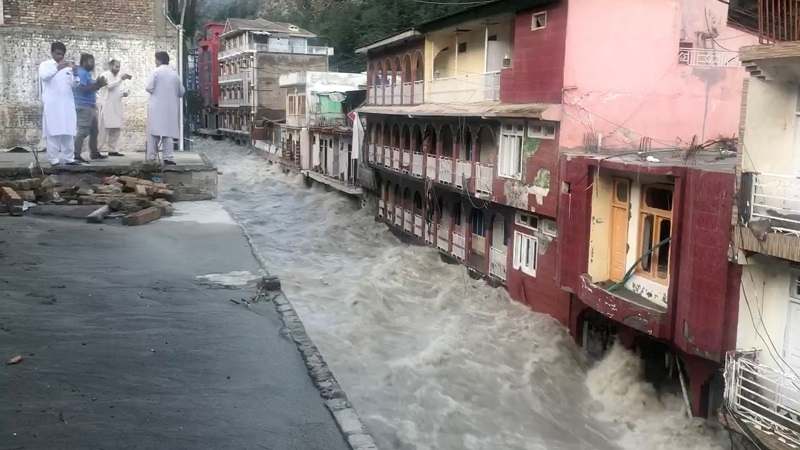
Men watch floodwaters flow through the bazar area in Bahrain, Pakistan August 29, 2022 in this still image taken from social media video.
10:54 JST, August 31, 2022
Multistory hotels crumbling into rising waters. Surging waves crashing into elevated roads and bridges. Millions of people driven from their homes.
Showing videos of what they called “apocalyptic” floods currently sweeping their country, Pakistan’s leaders led by Prime Minister Shehbaz Sharif pleaded on Tuesday for aid from developed nations, who they said were responsible for bringing extreme weather to one of the world’s most vulnerable regions.
“I can say without any fear of contradiction, this flood situation is probably the worst in the history of Pakistan,” Sharif said.
The South Asian country of about 220 million people is now facing an unprecedented crisis after eight consecutive weeks of heavy rainfall. The floods have killed 1,100 people, affected more than 33 million residents, wiped out 1 million homes and destroyed about 2,200 miles of roads, Pakistani officials said Tuesday. Nearly 500,00 people are in displacement camps.
The death toll and economic burden are expected to rise, adding stress to an economically fragile and politically divided country.
“We want to showcase this to the developed world in particular,” Ahsan Iqbal, the minister for planning and development, told reporters in Islamabad. “The quality of life that people in the west are enjoying today, someone is paying the price in the developing world.”
In southern Sindh province’s Khairpur, one of the hardest hit districts, Zahid Ali Jalalani, a 35-year-old farmer, experienced nonstop rain for the past two months. The water level in his village was rising slowly at first. Then came the flood.
One night last week, as he rested with his wife and two children in their single room home, a nearby canal burst, crashing into houses. Some parts of his village were instantly submerged under 10 feet of water.
“At one time it seemed as if the walls were shaking, as if there was an earthquake,” he said. “I thought this was the day of judgment, our last hours alive.”
As the water receded, Jalalani ran into the darkness to help villagers save residents, some of whom were trapped with water up to their necks. About 250 villagers were hurt when their walls caved in. One man drowned in his home.
Now, hundreds of people from his village are living in a makeshift camp that is lacking tents, food and medicine, Jalalani said. “We are living, thank God, but in terrible conditions,” he said. “But people are not willing to go back. Even those whose houses are still standing, they think they could collapse at any time.”
The growing number of extreme weather events around the world is due to the planet’s rising temperatures, weather experts say. Higher temperatures mean more water in the air: For every degree of warmer temperature, the air can hold about 4 percent more water, leading to torrential rainfall.
Pakistani officials said Tuesday that the country experienced a slew of abnormal weather events this year. Four heat waves came immediately after the winter, leading to a year “without spring.” The heat scorched crops. But in recent weeks, parts of Pakistan experienced about four times more rainfall than the 30-year average. In Sindh, the city of Karachi has seen 48 inches of rainfall in the past two months. The financial hub, which has a desert climate, usually sees less than 10 inches of rainfall per year.
Sherry Rehman, Pakistan’s climate minister, said the government has been distributing water pumps to Karachi in recent weeks but the equipment has been overwhelmed.
“Where do you drain the water?” she said. “It’s an ocean. It’s a merciless sky.”
The flooding comes at a particularly difficult time for Pakistan.
Even before the floods, Pakistan faced a steep fall in foreign exchange due to soaring global commodity prices and a rise in the U.S. dollar. The cost of electricity and food has soared. Pakistan has sought a bailout from the International Monetary Fund, which approved the request on Monday and released $1.1 billion to the country.
Now, the flood is expected to add $10 billion worth of damage to the teetering economy.
On Tuesday, the United States Agency for International Development announced $30 million in humanitarian aid, adding to a United Nations contribution of $3 million last week. The U.N. said it was also launching a new flood relief plan for Pakistan, as its officials echoed calls for greater contributions from around the world.
“This super flood is driven by climate change – the causes are international and so the response calls for international solidarity,” said the U.N. humanitarian coordinator in Pakistan, Julien Harneis.
Pakistani officials, who have been criticized domestically for not doing enough to respond to the floods, rebuffed the criticism and said no amount of planning would have mitigated the disaster. The country was experiencing a preview of the extreme weather that will eventually hit elsewhere in the world, said Rehman, the climate minister.
“We are literally on the front lines of unfolding climate catastrophe,” she said. “It will happen to others later. It’s time we all took notice.”
Top Articles in News Services
-

Survey Shows False Election Info Perceived as True
-

Prudential Life Expected to Face Inspection over Fraud
-

Hong Kong Ex-Publisher Jimmy Lai’s Sentence Raises International Outcry as China Defends It
-

Japan’s Nikkei Stock Average Touches 58,000 as Yen, Jgbs Rally on Election Fallout (UPDATE 1)
-

Trump Names Former Federal Reserve Governor Warsh as the Next Fed Chair, Replacing Powell
JN ACCESS RANKING
-

Japan PM Takaichi’s Cabinet Resigns en Masse
-

Japan Institute to Use Domestic Commercial Optical Lattice Clock to Set Japan Standard Time
-

Israeli Ambassador to Japan Speaks about Japan’s Role in the Reconstruction of Gaza
-

Man Infected with Measles Reportedly Dined at Restaurant in Tokyo Station
-

Videos Plagiarized, Reposted with False Subtitles Claiming ‘Ryukyu Belongs to China’; Anti-China False Information Also Posted in Japan

























